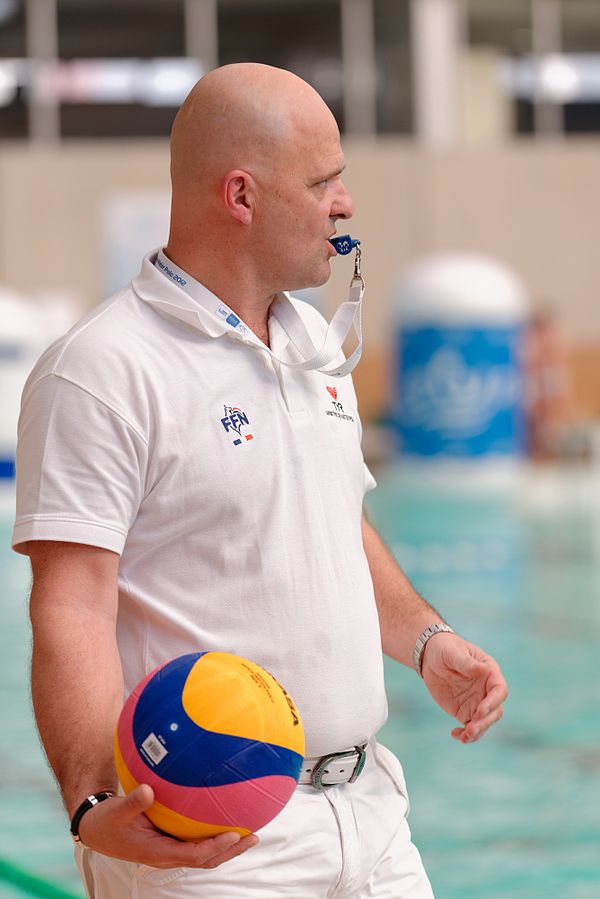The sport is known for being physically demanding and highly competitive. One important aspect of water polo is the role of the referees. Referees are responsible for enforcing the rules of the game, ensuring player safety, and maintaining fair play.
In water polo, a game is always officiated by one or two referees. Typically, two referees are utilized at a higher level; however, if there is a shortage of available referees at lower levels, a single referee may oversee the game.
Knowing the number of referees in water polo is important for players, coaches, and fans of the sport. It can help them understand the rules of the game and what to expect during a match.
Whether you are a seasoned water polo player or a newcomer to the sport, understanding the role of the referees is essential for enjoying the game to its fullest.
The Role of Referees in Water Polo
Being a water polo referee is not an easy job. They face many challenges, such as dealing with aggressive players, making split-second decisions, and dealing with the pressure of the game. However, they play a crucial role in ensuring that the game is played fairly and that everyone has a fair chance to win.
They are responsible for making calls on fouls, penalties, and other infractions that may occur during the game. Referees must have a thorough understanding of the rules and regulations of water polo to make accurate and fair decisions during the game.
Referees also play a crucial role in ensuring the safety of the players. They must be vigilant in watching for dangerous plays or actions that could result in injury. If a player is injured during the game, the referees will stop play to ensure that the player receives the necessary medical attention.
Overall, the role of the referees in water polo is essential to the success and safety of the game. With their knowledge of the rules and regulations of the sport, referees can ensure that all players have a fair and enjoyable experience while playing the game.
Number of Referees in Water Polo
In most water polo games, there are two referees on the pool deck. The two referees in a standard water polo game are positioned on opposite sides of the pool.
One referee is positioned on each side of the pool to ensure that they have a clear view of the action. They communicate with each other throughout the game to ensure that they are making consistent calls and that all players are playing within the rules.
They are responsible for calling fouls and making sure that the game is played fairly. They also keep track of the time and signal when a goal is scored.
In addition to the two referees, there is also a table official who keeps track of the score, the time, and any penalties or exclusions. The table official works closely with the referees to ensure that the game runs smoothly and that all the rules are being followed.
The number of referees may vary depending on the level of competition.
International Competitions
International competitions, such as the Olympics and the World Championships, are played with two referees. The referees are responsible for enforcing the rules of the game and ensuring that the game is played fairly.
They have the power to award fouls, penalties, and exclusions, and they can also stop the game if necessary. The referees work together to make sure that they have a clear view of the entire pool and can make accurate decisions.
National Competitions
National competitions, such as the national championships, are also played with two referees. The referees are responsible for ensuring that the game is played fairly and that the rules are followed.
They have the power to award fouls, penalties, and exclusions, and they can also stop the game if necessary. The referees work together to make sure that they have a clear view of the entire pool and can make accurate decisions.
Youth and Recreational Leagues
Youth and recreational leagues may be played with only one referee. The referee is responsible for ensuring that the game is played fairly and that the rules are followed.
They have the power to award fouls, penalties, and exclusions, and they can also stop the game if necessary. The referee works alone to make sure that they have a clear view of the entire pool and can make accurate decisions.
Referee Qualifications
Certification and Training
To become a water polo referee, individuals must complete certification and training programs. USA Water Polo offers a certification program that includes online training, referee schools, and evaluations. The program covers playing rules and interpretations, level certification criteria, and referee code of conduct.
Referees must pass an online prerequisite course and test to continue their training and be prepared to undertake a FINA Water Polo Certification School.
Experience and Skillset
In addition to certification and training, referees should possess certain qualities and skills. Referees must have a good understanding of the rules and regulations of water polo.
They must also be able to make quick and accurate decisions during the game. Good communication skills are essential for referees to effectively communicate with players, coaches, and other officials. Referees must also have physical stamina to keep up with the fast-paced nature of the game.
Referees gain experience through officiating games at different levels, from local to national competitions. Experienced referees are often assigned to officiate at higher-level competitions, such as international tournaments. Referees must also stay up-to-date with rule changes and attend regular training sessions to maintain their certification.
In summary, becoming a water polo referee requires completing certification and training programs, possessing a good understanding of the rules and regulations, making quick and accurate decisions, having good communication skills, and having physical stamina.
Experienced referees are often assigned to officiate at higher-level competitions and must stay up-to-date with rule changes to maintain their certification.
Referee Signals and Calls
Water polo referees are responsible for enforcing the rules of the game and ensuring fair play between the teams. They use a variety of signals and calls to communicate with players and coaches during the game. Here are some of the most common signals and calls used by water polo referees:
- Whistle Blows: Referees use the whistle to signal the start and end of play, as well as to call fouls and other infractions. One whistle blast indicates a minor foul, while two blasts indicate a major foul or exclusion.
- Hand Signals: Referees use hand signals to indicate which team has possession of the ball, which player has been excluded, and which player has been penalized with a penalty shot. They also use hand signals to indicate the direction of play and to call for a timeout.
- Yellow and Red Cards: Referees use yellow and red cards to indicate misconduct by players or coaches. A yellow card serves as a warning, whereas a red card leads to expulsion from the game.
It is important for players and coaches to understand these signals and calls in order to avoid confusion and ensure fair play.
Referees are trained to use these signals and calls consistently and accurately, but mistakes can still occur. If a player or coach has a question or dispute about a call, they can ask the referee for clarification.
Overall, the role of the referee in water polo is crucial to maintaining a safe and fair playing environment for all participants. By understanding and respecting the signals and calls used by referees, players and coaches can help ensure that the game is played with integrity and sportsmanship.
Controversies and Challenges Faced by Referees
Refereeing can be a challenging and thankless job, especially in water polo, where the referees are responsible for ensuring the safety of the players and the fairness of the game.
Despite their best efforts, referees often face controversies and challenges that can make their job more difficult than it already is.
One of the biggest controversies in water polo refereeing is the use of video replay. While video replay can help referees make more accurate calls, it can also slow down the game and disrupt the flow of play. Moreover, not all water polo games have access to video replay, which can create a sense of unfairness among players and fans.
Another challenge faced by water polo referees is dealing with player misconduct. Water polo is a physical sport that can sometimes lead to heated exchanges between players.
Referees must be able to keep their cool and defuse tense situations while also enforcing the rules of the game. Failure to do so can result in penalties, suspensions, or even physical altercations.
Lastly, water polo referees must also deal with the issue of bias. Like all human beings, referees have their own biases and preferences, which can sometimes cloud their judgment.
Moreover, referees can be influenced by external factors such as the home crowd, the reputation of the teams, or the importance of the game. To minimize the impact of bias, water polo referees must be trained to be impartial and to make decisions based on the facts of the game.
Conclusion
Water polo is a competitive sport that requires a team of referees to ensure the game is played fairly and safely. The number of referees required for a game depends on the level of competition and the rules of the governing body. Generally, there are two referees and one table official for each game.
According to USA Water Polo, there are different levels of referee certification, including National Referee, Junior National Referee, and Certified Referee. The governing body also provides training and resources for referees to improve their skills and knowledge of the game.
Despite the challenges facing water polo referee development, including the pandemic, the sport continues to attract new referees and officials. The dedication and commitment of these individuals ensure that water polo remains a fair and safe sport for all players.







